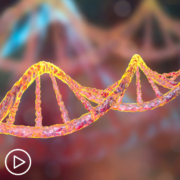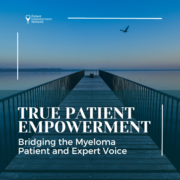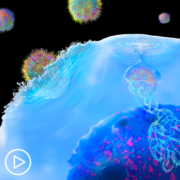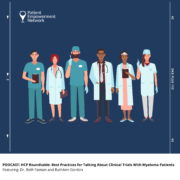What Experts Are Learning About the Hereditary Risk of Myeloma
What Experts Are Learning About the Hereditary Risk of Myeloma from Patient Empowerment Network on Vimeo.
Myeloma experts Dr. Irene Ghobrial and Dr. Betsy O’Donnell share research updates on predicting the risk of developing myeloma, both from inherited genetics as well as environmental factors.
Dr. Irene Ghobrial is Director of the Clinical Investigator Research Program at Dana-Farber Cancer Institute and Professor of Medicine at Harvard Medical School. Learn more about Dr. Ghobrial.
Dr. Betsy O’Donnell is Assistant Professor of Medicine at the Dana-Farber Cancer Institute specializing in Plasma Cell Disorders.
Related Programs:

Understanding MGUS & Smoldering Myeloma: What’s the Difference? |

|

|
Transcript:
Katherine Banwell:
Is there any research on predicting hereditary risk of myeloma?
Dr. Irene Ghobrial:
Yes, so part of the PROMISE study is trying to understand what is the risk of developing myeloma? So, we’re recruiting people who are either African American, because they have a three times higher chance of developing myeloma compared to the white population, as well as people who have a first degree family member with a plasma cell disorder.
Or even any blood cancer because now we see that CLL and lymphoma and myeloma can actually come together. And we’re now doing something called whole genome sequencing of all of the DNA that you inherit from Mom or Dad called the germ line. Basically, we try to see did you inherit the gene from Mom or Dad that increases your risk to myeloma?
Now, it’s not as high as something like BRCA1 mutation or 2 mutation, where if you have that, you’re high, high chance of developing breast cancer or ovarian cancer and so on. We probably have several factors that need to be put together. You inherit something and then the environment adds something, and then as we get older, we get the hit.
Or you inherit something that changes your immune system, and that allows the plasma cells to start proliferating faster because they are reacting as an immune cell, and that allows the hit of myeloma to happen. And we’re working on that, and we would really encourage everyone who has a relative with myeloma, sign up on PROMISE study.
Because that’s how we can get the answer. That’s how we can say it’s not because you are an African American or you’re white. It’s not because you have a first-degree family member or not. It’s because of this gene. So, taking away race, taking away all of those factors, taking away age and trying to go back to the biology. Is it a certain gene, is it the certain immune cell that makes us go to that risk?
And then Dr. O’Donnell is really taking it to the next level. Now what is in the macro environment? So, we talked about what we inherit, but it’s like nurture and nature, right? So, nature is the genetics and then nurture, what do we eat? What do we change? Obesity, health, all of those things change our inflammation level and change our ability to basically prevent those myeloma cells from starting or from continuing to progress. And she can potentially talk about her work on microbiome, on the tiny bacteria that are in our body from what we eat. So, maybe, Betsy?
Katherine Banwell:
Okay.
Dr. Betsy O’Donnell:
Absolutely. Yes, so one of the things that particularly interests me is the effect of lifestyle on our risk of getting cancer.
And specifically within plasma cell disorders, and I think there have been other cancers, breast cancer and colon cancer, where they’re a couple steps ahead of us just in understanding the influence of things like obesity and the gut microbiome. So, the specific bacteria that are within your intestinal tract. It makes a lot of sense in colon cancer, but we think that that’s not limited to diseases like that. We actually think that these microbiomes, which are influenced by the foods that you eat, may have a relationship with your immune system. And remember, myeloma is a cancer of the immune system.
So, we’re all working together on our team here on a very scientific level to understand lifestyle influences and how they may cause or potentiate multiple myeloma. And so we’re excited to kind of bring this piece together. When you think about the spectrum of plasma cell disorders, not everybody goes on to myeloma, but a lot of people sit in these early precursor diseases, MGUS and early smoldering.
And so are there things that people can do for themselves that might influence their gut microbiome, or if it’s the amount of body fat that we have that’s very involved in cell signaling? Can we modify those things, exercise more potentially, that will decrease our body inflammation levels or alter those pathways that have been set in process that, by altering them, may decrease the risk of going on to more advanced plasma cell disorders?
Katherine Banwell:
That’s such great information.










